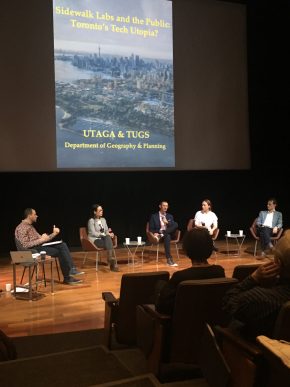 On October 17, Sidewalk Labs, a subsidiary of Google parent Company Alphabet Inc., inked a deal with Waterfront Toronto and City of Toronto to develop 800 acres of waterfront property in Toronto with the goal of developing an experimental digital utopia, a potential prototype for future ‘Smart Cities’.
On October 17, Sidewalk Labs, a subsidiary of Google parent Company Alphabet Inc., inked a deal with Waterfront Toronto and City of Toronto to develop 800 acres of waterfront property in Toronto with the goal of developing an experimental digital utopia, a potential prototype for future ‘Smart Cities’.
Since then, there has been much debate and discussion about the future of Sidewalk Labs in Toronto, with data mining and privacy issues at the forefront. However there has been surprisingly little coverage on other key issues that affect the public, including governance, urban planning, infrastructure, and community engagement.
In the hopes of addressing this gap, the University of Toronto Association of Geography Alumni (UTAGA) and the Toronto Undergraduate Geography Society (TUGS) organized a panel titled Toronto’s Tech Utopia? How do we think about the public in the context of the Sidewalk Labs Proposal? The goal, according to TUGS co-president Alex Walton, was to both build connections and dig deeper into the Sidewalk Labs conversation:
On top of creating a space for current students and geography alumni to engage in a conversation of interest to both cohorts, the event also intended to shift discourse about the Sidewalk Labs’ project beyond questions of privacy and data collection. In doing so we hoped to create a space to unpack buzz words used in project branding like ‘urban innovation’ and explore questions about the project’s afterlife.
The panel consisted of four experts that could address these questions. Shoshanna Saxe (Department of Civil & Mineral Engineering, UofT) elaborated on her concern of treating the built environment like a tech product, questioning the longevity and stability of the project’s infrastructure and its disregard for effective ‘low tech’ solutions. Alex Mather of The Keesmaat Group echoed this concern from the perspective of city governance, posing several questions as to who will be responsible for maintenance and upkeep. What is the plan if something breaks? Will Sidewalk Labs work with city services to meet basic needs? And who will pay for these services, especially if down the line the experiment is abandoned by its creator?
Matti Siemiatycki (Geography & Planning, School of Cities, UofT), an expert on public-private partnerships, framed the issue as an opportunity for the city of Toronto to think about its own potential for innovation beyond short-term tech experiments. He pointed to other cities that have engaged in larger scale urban transformations to achieve similar goals of jobs, housing, and environmental sustainability that Sidewalk Labs promotes. Zhixi Zhuang (School of Urban and Regional Planning, Ryerson University) stressed the importance of diverse community participation as a part of urban innovation. If done right, she argued, a project like Sidewalk Labs could reflect the diversity of Toronto and provide opportunities for small businesses and community services to thrive.
Driving these discussion points was moderator Eli Singer (NearNow), whose unique curation of the event allowed for short focused debates and active participation with audience members. Several attendees commented on the strength of this moderation style, finding the pace engaging and the discussion thought-provoking.
The panel offered fresh insights, bringing to light just how important it is to have these ongoing conversations. This was a clear outcome for UTAGA Vice-President, Zenon Godzyk:
Going forward we need to discuss and debate the issues in public forums. All the issues. Geographers are [especially] well qualified to assist [with this] and it was important for us to organize this panel [at such a crucial time].
UTAGA and TUGS are hopeful to continue this conversation. They plan to host more events in the future that engage in timely topics through the pertinent lens of geography and planning.
Are you an undergraduate student interested in joining TUGS? Click here or email uoft.tugs@gmail.com for more information.


